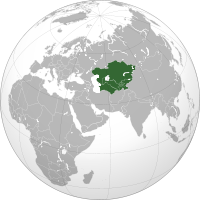Weak Central Asian States Fail Internal Security Challenges – OpEd
By VOR
By Yekaterina Kudashkina
Irina Chernykh, the leading researcher at the Kazakhstan Institute for Strategic Studies under the President of the Republic of Kazakhstan, believes that all tension in Central Asia is determined by the countries’ weakness, which they demonstrate when coping with their internal security issues.
Of course we can say about some tension in Central Asia but this tension has mostly domestic character, than rather inter-state one. The idea is that the domestic problems within each Central Asian country are the most important. Their influence on the Central Asian security is more significant than the relationships between Central Asian countries themselves. The reason is that each Central Asian country is a weak state. We can say that there is a lack of infrastructural capacities in terms of the ability of state institutions to perform essential tasks and enact policy. Also we can say that within the Central Asian countries there is a lack of capacity in terms of a state’s ability and willingness to employ force against the challenges to its authority. And the last characteristic of a weak state which is really very applicable to each Central Asian country is national identity and social cohesion in terms of the degree to which their population identifies itself with the nation state and accepts its legitimate role in their lives.

All tension in Central Asia is determined by states’ weakness. At the same time I can say that Central Asian states resolving these issues, I mean issues which deal with a weak state, they try to use foreign policy. If we will analyze the last border accident between Kirgizstan and Uzbekistan, we can see that this event is mostly determines by the willingness of Kirgizstan to improve or develop its own infrastructure. They construct new roads which lie in disputable territories and touch some national security interests of Uzbekistan. Of course this incident creates some threats to Uzbekistan. And there is another example with the construction of Rogun Hydro Station. It is also connected with the interests of Uzbekistan in national security.
All these cases of course give us evidence that some tension between states exists but at the same time I’m sure that the inter-state tension will significantly influence and increase tension within Central Asia. My argument for this position is not only the last event with enter-ethnic conflict in Osh and Jalalabad in south of Kirgizstan in 2010 but all the previous history during the last 20 years when the Central Asian countries owed independence. We had a civil war in Tajikistan which hasn’t spilled over the Tajik state border, this war was localized within Tajikistan. Another issue or event which I already mentioned is this inter-ethnic conflict in the south of Kirgizstan. No one Central Asian country interfered the Kirgizstan territory for resolving this conflict. Even Uzbekistan, the state which has very close connections with Uzbek diaspora which lives on the territory of Osh and Jalalabad, even Uzbekistan did not take any action to resolve this conflict.
And I think that this fact gives evidence that inter-ethnic relationship will not significantly influence the escalation of Central Asian security situation in the future. Of course we have to take into consideration the fact the US military troops will withdraw from Afghanistan in 2014 but I seriously doubt that the US is interested in destabilization of the security situation within Central Asia. The reason is that US as minimum is interested in keeping stable situation for the period when they will withdraw their troops from Afghanistan. Moreover the US has interest to share responsibility for the security within the region and in Afghanistan in particular with Central Asian countries. We can say that the concept of a larger Central Asia which was proposed by the US analysts several years ago is also evidence that United Sates would like to share responsibility for security within the Central Asia with Central Asian countries.
The material resources are including the military equipment and some arms which might be given to some Central Asian countries after the US troops withdrew from Afghanistan, from my point of view, will not influence significantly the destabilization of the Central Asian situation in the sphere of security. Why? First of all, the Central Asian countries still have Soviet military standards. And if Uzbekistan for example will take some American equipment or even heavy weapons – how much of this equipment Uzbekistan has to receive for shifting the Soviet military standards to the NATO or US military standards, that is the question. The second point is that the US, from my point of view, are not interested to give some Central Asia countries heavy military equipment because it is a knowhow of the US military services and they will not share because the Central Asian countries are not real allies of the US like Georgia for example.
